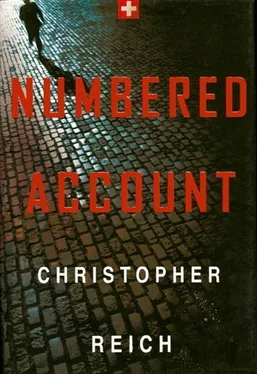“Guten Morgen, Herr Neumann,” said Armin Schweitzer. “How is our resident American managing today?” He pronounced the word American as if it were a sour lemon. “Checking on the continued meltdown of your beloved dollar or just having a look at the all-important basketball scores?”
Nick spun in his chair to face the bank’s director of compliance, noticing the man’s scuffed brogues and his short white socks. “Good morning.”
Schweitzer waved a sheaf of papers. “I have the newest warrants from the American gestapo. Friends of yours, are they?”
“Hardly friends,” Nick answered, a shade louder than he would’ve liked. Schweitzer made him nervous. He emanated a kind of palpable instability. A toxic chemical best kept at room temperature.
“You’re sure?” asked Schweitzer.
“I resent the intrusion into our bank’s affairs as much as anyone. We should be fighting these requests for confidential information by all means possible.” Inside, Nick shuddered. A large part of him actually believed his own words.
“‘Our bank,’ is it, Mr. Neumann? Six weeks off the boat and already a claim of ownership. My, how they teach you to be ambitious in America.” Schweitzer smiled unevenly and leaned closer. His breath was bitter with the dregs of that morning’s coffee. “Unfortunately, it seems that your American friends have left us no alternative but to cooperate. What splendid consolation to know that your sentiments are in the correct place. Perhaps one day you will have a chance to prove such heartfelt loyalty. Until then, I advise you to keep your eyes open. Who knows? One of your clients may be on this list.”
Nick caught a glimmer of hope in Schweitzer’s voice. So far there had been no bites on the four accounts that had originally been listed; no activity that might fit Sterling Thorne’s strict criteria. Nick took the updated account surveillance list and laid it on his desk without glancing at it. “I’ll keep my eyes open,” he said.
“I expect no less,” called Schweitzer over his shoulder as he left the room. “Schonen Tag, noch.”
Nick watched him go before picking up the updated sheet. Six accounts were listed. The four from the previous week plus two new ones. Numbered accounts 411.968.OF and 549.617 RR.
Nick stared at the last number.
549.617 RR.
He knew it by heart. Every Monday and Thursday at three P.M. Set your clock to it. Six digits, two letters. Today they spelled the directions for the quickest route to hell. Ninth circle. First class. Nonstop. “The Pasha,” he whispered aloud.
On Monday, Nick had demanded to listen to their notorious client. Though initially opposed, Sprecher had relented, knowing that he wouldn’t be in the office next time the Pasha called. “Wait until you hear him,” Sprecher had said. “The man is cold.” And so while speaking to him on the telephone, he had broadcast his client’s voice from a tinny speaker.
The Pasha’s voice was low and rough, Nick remembered. Like an empty cardboard box being dragged across a gravel lot. Demanding but not angry. Intonation a tool, not an emotion. Listening to the voice, he had felt a shiver growing at the base of his spine, at that tiniest of nubs where intuition signals the arrival of an unwelcome event.
Now, seated at his cramped desk, he stared at the Internal Account Surveillance List and felt the same curious tingling, the same frisson of anxiety itching at the base of his spine. From all exterior appearances the list was an innocent sheet of USB stationery, “Strictly for internal use” printed in bold letters across the upper left corner, its body sullied only by the four-word heading, the six account numbers below, and an admonition stating “All transactions regarding above accounts must be reported immediately to your superior and/or directly to Compliance, ext. 4571.”
In seven hours, the holder of account 549.617 RR would phone. He would inquire as to the balance in his account, then he would ask that it be transferred to several dozen banks around the world. Should Nick transfer the money as asked, he would deliver the Pasha into the hands of the United States Drug Enforcement Administration. Should he delay the transfer, the Pasha would have escaped their grasp—at least for now.
Schweitzer’s admonition reverberated in his head: “One of your clients might be on this list…” And then? Nick asked himself. Would he contact Schweitzer in conformity with the bank’s directives? Would he tell him that a client whose account number was on the surveillance list had executed a transaction that required the bank to “voluntarily” inform the United States DEA?
Nick’s mind shot back to the Keller Stubli, to Peter Sprecher’s wild accusations. The Pasha: thief, smuggler, embezzler. Why not add “murderer” and cover all the bases? Four weeks ago, Nick had defended his reputation, and by extension, that of the bank. But hadn’t he always suspected, if not the worst, well, then, at least something worse? Something marginally at odds with the laws of Western society?
“The Pasha,” he mused. “International criminal.” Why not?
Few at the bank even knew the man’s identity. One of them, Marco Cerruti, was currently suffering from, and here Nick chose the official terminology, “chronic stress-related fatigue.” So much prettier than saying the poor guy had suffered a force-ten nervous breakdown. It was Cerruti who had given the Pasha his nickname; Cerruti who for years had personally handled the account. Had he in his choice of sobriquet provided a clue to the identity of his client? Could he have been referring to the man’s nationality, or perhaps, more pointedly, hinting at his character?
Nick rolled the word around in his mouth. The Pasha. It oozed a familiarity with corruption. He envisioned a slowly turning ceiling fan scattering clouds of blue cigarette smoke, a whispering palm brushing against a shuttered window, and a crimson fez with a braided golden tassel. The Pasha. It recalled the slutty elegance of a once great empire, now tired and dilapidated, and gliding toward the devil with a wicked nonchalance.
The phone rang, waking Nick from his anxious reverie.
“Neumann speaking.”
“Hugo Brunner, chief hall porter, here. An important client has arrived without an appointment. He wishes to open a new account for his grandson. Your name has been posted as duty officer. Please come down immediately to Salon 4.”
“An important client?” This worried Nick. He wanted to pawn him off on somebody else. “Shouldn’t his regular portfolio manager handle it?”
“He is not yet on the premises. You must come immediately. Salon 4.”
“Who is the client? I’ll need to bring down his dossier.”
“Eberhard Senn. The Count Languenjoux.” Nick could practically hear the porter’s teeth gnashing. “He owns 6 percent of the bank. Now hurry.”
Nick forgot all about the surveillance list. Senn was the bank’s largest private shareholder. “I’m only a trainee. There must be someone more qualified to meet with Mr. Senn—uh, the count.”
Brunner spoke slowly and with a fury that brooked no excuse. “It is twenty minutes before eight o’clock. No one else has arrived. You are the duty officer. Now move it. Salon 4.”
“My grandfather was a close friend of Leopold of Belgium,” bellowed Eberhard Senn, the Count Languenjoux. He was a chipper man of eighty dressed in a neat Prince de Galles suit and a sprightly red bow tie. “Do you remember the Congo, Mr. Neumann? Belgians stole the whole damned country. Hard to do that nowadays. Take that tyrant Hussein: Tried to steal the postage stamp next door and got his cheeks waxed.”
“Soundly defeated,” translated Hubert, the count’s grandson, a blond waif of twenty swallowed by a three-piece navy pinstripe. “Grandfather means that Hussein was dealt a crippling defeat.”
Читать дальше












